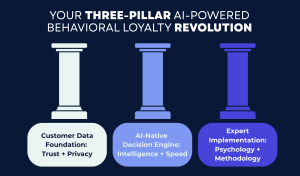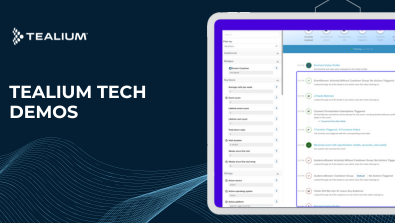The Loyalty Paradox Crisis
Most of us use multiple “loyalty” cards in one shopping trip, yet a 10% discount would easily sway us. Consumers join many programs but actively engage with few, as most simply force compliance through what amounts to a transaction tax. When every brand has a loyalty program, no one has a competitive advantage; loyalty becomes coercion, systematically commoditizing the customer experience across industries.
Secure Your Seat for the 16th September!

Join our exclusive webinar, “Real-Time Loyalty, Real Business Impact“ to see live demonstrations of sub-100ms AI decisioning, case studies showing significant revenue improvements, and the methodology that delivers results.
Learn how privacy-first approaches improve personalization and trust, securing your first-mover advantage. Limited seats available.
Financial and Strategic Consequences
Traditional loyalty programs face a devastating economic reality: According to Forrester, brand loyalty is predicted to decline by 25% by 2025, with 75% of customers ready to abandon programs for better prices. This exacerbates customer acquisition costs, which have risen 222% since 2013 and are 5-25x higher than retention (Think Impact: Customer Retention Statistics 2025). Compounding this, 83% of businesses struggle with engagement (BCG: Loyalty Programs and Customer Expectations Are Growing 2024), as average loyalty programs see only a 59% activity rate (Nudge: Customer Loyalty Program Statistics and Facts for 2025), indicating widespread customer abandonment despite technical membership.
Market disruptions happen in real-time these days, and the market is actively rewarding companies that prioritise relationships over points. A UK digital bank, for instance, achieved 31% customer growth by focusing on genuine financial partnership, not traditional rewards (9minds: Leading Bank Loyalty Programs for 2025).
Similarly, a top UK utility company, facing failing traditional loyalty and low trust, revolutionised its approach through AI-powered behavioral rewards, resulting in double NPS (Net Promoter Score) among members, increased customer lifetime value, and a 50% reduction in churn amidst record industry departures. That proved that even the most challenging sectors can transform customer relationships through intelligent personalization.
The Three-Pillar AI-Powered Behavioral Loyalty Revolution
The AI-powered behavioral loyalty revolution offers a solution beyond mere points, leveraging AI at machine speed with human psychological understanding.

This revolution hinges on three integrated pillars, where a Customer Data Platform plays a foundational role:
- Trust + Privacy: Getting Customer Data Foundation Right
Customers are highly sensitive to how companies use their personal data.
Proper data collection and usage, privacy, and accessibility are crucial for building trusted experiences, and a Customer Data Platform (CDP) provides the essential foundation, enabling organizations to build a privacy-first approach that drives loyalty and retention to delight buyers. When customers trust how their data is used, they share more behavioral signals, enabling better AI decisions and driving significant ROI in consent management. - Intelligence + Speed: Activating with Real-Time AI Orchestration
To enhance call center engagement and reduce drop-off, one organization leveraged Tealium-powered, AI-native decisioning. This enabled real-time propensity-to-buy scoring, dynamically updated with live and historical data, to instantly detect high-intent callers. These high-value customers bypassed standard queues, receiving personalized interactions from dedicated sales agents within milliseconds, ensuring contextual engagement the moment interest was expressed.
Modern AI engines like this process behavioral triggers, analyse thousands of business rules, and deliver personalised actions faster than customers can think. This unlocks predictive modeling at scale—with every customer interaction powered by machine learning. With 100% confidence in the model’s performance within days, this use case proves that when AI meets real-time orchestration, customer journeys can be not only personalised—but optimised for business impact in the moment. - Psychology + Methodology: Implementing New Technology Successfully
“Start thinking of Customer Experience based on leveraging technology rather than building technology to build Customer Experience,” advised Pallavi Modi, responsible for customer acquisition, retention, and AI-driven product platforms at Zooplus. She shared a powerful insight: transforming customer obsession into an operational strategy requires more than just technology. It is crucial that companies build the culture and processes around the tech to unlock its real value.
Consequently, to avoid that your AI project becomes one of the 80% that fail (CIO Dive: AI Project Failure Rates Report 2024), you need a blend of behavioral psychology, proven methodology, and strong organisational change management skills. True innovation and the most sophisticated data strategies are grounded in simplicity and empathy, reminding us that real impact comes not from the tools themselves, but from how we use them to serve our customers. An Intelligent Data Platform is crucial here, helping organisations build the robust data foundation and infrastructure necessary to shift from campaign thinking to genuine relationship orchestration.
Academic Validation Meets Real-World Results
The power of AI-powered behavioral loyalty is undeniable, backed by both proven performance metrics and robust academic validation. Companies are seeing significant gains, including 10–15% revenue lifts, and 40% more revenue than competitors according to a McKinsey report. As mentioned before, they also see increases in the NPS, and up to 15% churn reduction, with an average ROI of 3.7x according to Forrester.
Travel giant TUI Group, for example, leveraged AI to create a dynamic, behavior-based loyalty model that activates in real-time across marketing and service touchpoints. By using machine learning to predict future customer behavior and tailor outreach accordingly, they were able to increase conversions, improve customer satisfaction, and drive smarter personalisation at scale.
Real-world transformations, like an energy supplier achieving 50% churn reduction in just 7 months, also demonstrate rapid deployment and impact. Backed by academic research on intrinsic motivation and aspiration-based rewards, this behavioral revolution is delivering measurable results across financial services, retail, and beyond, proven by enterprise-scale validation processing over 1 billion daily customer decisions with sub-100ms response times, as published Pega CDH case studies demonstrate (Forrester: The Total Economic Impact of Pega Customer Decision Hub).
The Cost of Delaying Your Customer Loyalty Transformation
Delaying action is costly: Customer acquisition expenses are soaring, loyalty program engagement has plummeted to 59% (Nudge: Customer Loyalty Program Statistics and Facts for 2025), and new entrants are capturing market share without traditional programs. A massive personalisation gap persists (71% expect it, only 22% deliver, according to McKinsey), yet AI investment has surged past $100 billion in 2024, signalling that market leaders are embracing this transformation now.
The core question is no longer managing loyalty programs, but orchestrating behavioral transformation. Traditional loyalty fails because it’s built for an outdated era; today’s savvy customers demand real-time understanding, privacy, and rewarded positive behaviors.
The good news is: The most sophisticated loyalty transformation we’ve witnessed took just 7 months from concept to full deployment.
- The technology exists today.
- The methodology is proven.
- Academic research validates the psychological foundations.
- Market leaders are already capturing competitive advantages.
Success hinges on choosing integrated partners, who understand this isn’t just a tech project, but a customer relationship revolution driven by a seamless blend of data foundation, AI intelligence, and behavioral expertise.
About the Partnership: This article represents insights from the collaboration between Adqura (AI-driven customer decisioning expertise), Pega (Customer Decision Hub platform), and Tealium (Customer Data Platform), combining data foundation, AI intelligence, and implementation expertise to transform customer relationships through behavioral loyalty.
Authors: Sameer Prakash is Co-Founder and CTO of Adqura, a specialized consultancy delivering business outcome-driven AI solutions. With deep expertise in real-time decisioning and AI-powered customer engagement, he helps enterprises transform customer interactions through intelligent automation that delivers measurable business value. Annette Kerlin is a Senior Director of Global 1:1 Customer Engagement at Pegasystems, where she steers AI-powered omni-channel solutions that deliver substantial business value to global clients. With 20+ years of marketing, customer experience and real time decisioning leadership across major brands including HSBC, O2, EE, Nationwide Building Society and Vodafone, she brings deep expertise in transforming traditional marketing into AI-driven customer engagement strategies. Edited by Tealium.
Further Sources:
Forrester B2C Marketing & Customer Experience Predictions 2025, BCG: Loyalty Programs and Customer Expectations Are Growing (2024), McKinsey: The Value of Getting Personalization Right—or Wrong—is Multiplying, Forrester: The Total Economic Impact of Pega Customer Decision Hub, Think Impact: Customer Retention Statistics 2025, CIO Dive: AI Project Failure Rates Report 2024, Nudge: Customer Loyalty Program Statistics and Facts for 2025




